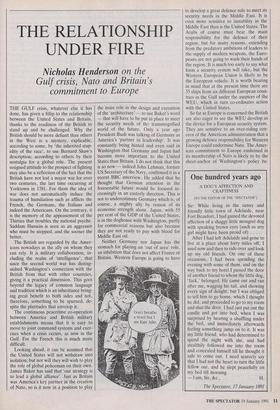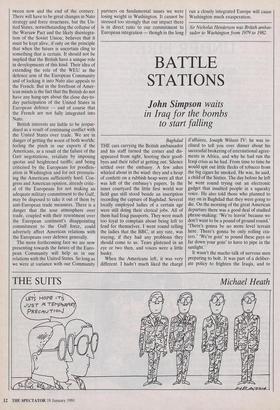THE RELATIONSHIP UNDER FIRE
Nicholas Henderson on the
Gulf crisis, Nato and Britain's commitment to Europe
THE GULF crisis, whatever else it has done, has given a fillip to the relationship between the United States and Britain, thanks to the readiness of the British to stand up and be challenged. Why the British should be more defiant than others in the West is a mystery, explicable, according to some, by 'the inherited stup- idity of the race', to use Bernard Shaw's description; according to others by their nostalgia for a global role. The present resigned attitude to the prospect of fighting may also be a reflection of the fact that the British have not lost a major war for over two centuries, the last time occurring at Yorktown in 1781. For them the idea of war does not automatically induce the trauma of humiliation such as afflicts the French, the Germans, the Italians and indeed the Americans. On the contrary, it is the memory of the appeasement of the Thirties that troubles the national psyche. Saddam Hussein is seen as an aggressor who must be stopped, and the sooner the better.
The British are regarded by the Amer- icans nowadays as the ally on whom they can rely. It is military collaboration, in- cluding the realm of 'intelligence', that since the second world war has disting- uished Washington's connection with the British from that with other countries, giving it a practical dimension. This goes beyond the legacy of common language and tradition which is an inheritance bring- ing great benefit to both sides and not, therefore, something to be spurned, de- spite the platitudes that envelop it.
The continuous peacetime co-operation between America and British military establishments means that it is easy to move to joint command systems and exer- cises when a crisis occurs, as now in the Gulf. For the French this is much more difficult.
Looking ahead, it can be assumed that the United States will not withdraw into isolation; but nor will they will wish to play the role of global policeman on their own. James Baker has said that 'our strategy is to lead a global alliance'. Just as Britain was America's key partner in the creation of Nato, so is it now in a position to play
the main role in the design and execution of the 'architecture' — to use Baker's word — that will have to be put in place to meet the security needs of the transmogrified world of the future. Only a year ago President Bush was talking of Germany as America's 'partner in leadership'. It was constantly being hinted and even said in Washington that Germany and Japan had become more important to the United States than Britain. I do not think that this is so now — indeed John Lehman, former US Secretary of the Navy, confirmed it in a recent BBC interview. He added that he thought that German attention in the foreseeable future would be focused in- creasingly in an easterly direction. This is not to underestimate Germany which is, of course, a mighty ally by reason of its economic strength alone. Japan, with 55 per cent of the GDP of the United States, is in the doghouse with Washington, partly for commercial reasons but also because they are not ready to pay with blood for Middle East oil.
Neither Germany nor Japan has the stomach for playing an 'out of area' role, an inhibition that does not affect France or Britain. Western Europe is going to have
to develop a great defence role to meet its security needs in the Middle East. It is even more sensitive to instability in the Middle East than is the United States. The Arabs of course must bear the main responsibility for the defence of their region, but for many reasons, extending from the predatory ambitions of leaders to the supply of modern weapons, the Euro- peans are not going to wash their hands of the region. It is much too early to say what form a security system will take, but the Western European Union is likely to be the European vehicle. It is worth bearing in mind that at the present time there are 35 ships from six different European coun- tries in the Gulf under the auspices of the WEU, which in turn co-ordinates action with the United States.
So far as Europe is concerned the British are also eager to see the WEU develop as the device for a European security system. They are sensitive to an over-riding con- cern of the American administration that a growing defence responsibility for Western Europe could undermine Nato. The Amer- ican commitment to Europe enshrined in its membership of Nato is likely to be the sheet-anchor of Washington's policy be- tween now and the end of the century. There will have to be great changes in Nato strategy and force structures, but the Un- ited States, notwithstanding the collapse of the Warsaw Pact and the likely disintegra- tion of the Soviet Union, believes that it must be kept alive, if only on the principle that when the future is uncertain cling to something that is certain. It should not be implied that the British have a unique role in developments of this kind. Their idea of extending the role of the WEU as the defence arm of the European Community and of locking it into Nato also appeals to the French. But in the forefront of Amer- ican minds is the fact that the British do not have any hang-ups about the close day-to- day participation of the United States in European defence — and of course that the French are not fully integrated into Nato.
British interests are liable to be jeopar- dised as a result of continuing conflict with the United States over trade. We are in danger of getting the worst of both worlds: feeling the pinch in our exports if the Americans, as a result of the failure of the Gatt negotiations, retaliate by imposing quotas and heightened tariffs; and being criticised by the Europeans for poodleis-. ation in Washington and for not pressuris- ing the Americans sufficiently hard. Con- gress and American opinion, already critic- al of the Europeans for not making an adequate military commitment to the Gulf, may be disposed to take it out of them by anti-European trade measures. There is a danger that the sour atmosphere over trade, coupled with their resentment over the European continent's disappointing commitment to the Gulf force, could adversely affect American relations with the Europeans over defence generally.
The more forthcoming face we are now presenting towards the future of the Euro- pean Community will help us in our relations with the United States. So long as we were at variance with our Community partners on fundamental issues we were losing weight in Washington. It cannot be stressed too strongly that our impact there is in direct ratio to our commitment to European integration — though in the long run a closely integrated Europe will cause Washington much exasperation.
Sir Nicholas Henderson was British ambas- sador to Washington from 1979 to 1982,



















































 Previous page
Previous page